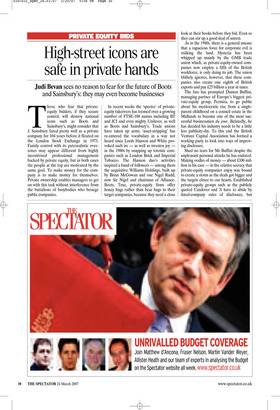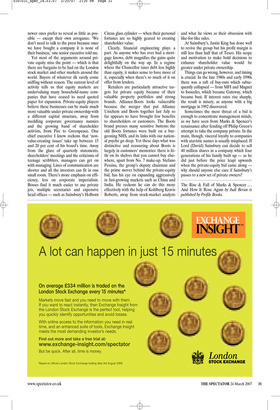High-street icons are safe in private hands
Judi Bevan sees no reason to fear for the future of Boots and Sainsbury’s: they may even become businesses Those who fear that privateequity bidders, if they secure control, will destroy national icons such as Boots and Sainsbury’s, might consider that J. Sainsbury fared pretty well as a private company for 104 years before it floated on the London Stock Exchange in 1973. Family control with its paternalistic overtones may appear different from highly incentivised professional management backed by private equity, but in both cases the people at the top are motivated by the same goal. To make money for the company is to make money for themselves. Private ownership enables managers to get on with this task without interference from the battalions of busybodies who besiege public companies. In recent weeks the ‘spectre’ of privateequity takeovers has loomed over a growing number of FTSE-100 names including BT and ICI and even mighty Unilever, as well as Boots and Sainsbury’s. Trade unions have taken up arms; ‘asset-stripping’ has re-entered the vocabulary in a way not heard since Lords Hanson and White provoked such ire — as well as investor joy in the 1980s by snapping up totemic companies such as London Brick and Imperial Tobacco. The Hanson duo’s activities inspired a band of followers — among them the acquisitive Williams Holdings, built up by Brian McGowan and one Nigel Rudd, now Sir Nigel and chairman of AllianceBoots. True, private-equity firms offer honey hugs rather than bear hugs to their target companies, because they need a close look at their books before they bid. Even so they can stir up a good deal of unrest.
As in the 1980s, there is a general unease that a rapacious force for corporate evil is stalking the land. Hysteria has been whipped up mainly by the GMB trade union which, as private-equity-owned companies now employ a fifth of the British workforce, is only doing its job. The union blithely ignores, however, that these companies also create one eighth of British exports and pay £25 billion a year in taxes.
The fuss has prompted Damon Buffini, managing partner of Europe’s biggest private-equity group, Permira, to go public about his meritocratic rise from a singleparent childhood on a council estate in the Midlands to become one of the most successful businessmen du jour. Belatedly, he has decided his industry needs to be a little less publicity-shy. To this end the British Venture Capital Association has formed a working party to look into ways of improving disclosure.
Shed no tears for Mr Buffini despite the unpleasant personal attacks he has endured. Making oodles of money — about £100 million in his case — in the relative secrecy that private-equity companies enjoy was bound to create a storm as the deals got bigger and the targets closer to our hearts. Established private-equity groups such as the publicly quoted Candover and 3i have to abide by listed-company rules of disclosure, but newer ones prefer to reveal as little as possible — except their own arrogance. ‘We don’t need to talk to the press because once we have bought a company it is none of their business,’ one senior executive told me.
Yet most of the arguments around private equity miss the point — which is that there are bargains to be had on the London stock market and other markets around the world. Buyers of whatever ilk rarely come sniffing without reason. The current level of activity tells us that equity markets are undervaluing many household-name companies that have ceased to need quoted paper for expansion. Private-equity players believe these businesses can be made much more valuable under private ownership with a different capital structure, away from meddling corporate governance nannies and the growing band of shareholder activists, from Pirc to Greenpeace. One chief executive I know reckons that ‘nonvalue-creating issues’ take up between 15 and 20 per cent of his board’s time. Away from the glare of quarterly statements, shareholders’ meetings and the criticisms of teenage scribblers, managers can get on with managing. Lines of communication are shorter and all the investors can fit in one small room. There’s more emphasis on efficiency, less on corporate imperialism. Bosses find it much easier to axe private jets, multiple secretaries and expensive head offices — such as Sainsbury’s Holborn Circus glass cylinder — when their personal fortunes are so highly geared to creating shareholder value.
Clearly, financial engineering plays a part. As anyone who has ever had a mortgage knows, debt magnifies the gains quite delightfully on the way up. In a regime where the Chancellor taxes debt less highly than equity, it makes sense to have more of it, especially when there’s so much of it on offer from lenders.
Retailers are particularly attractive targets for private equity because of their valuable property portfolios and strong brands. Alliance-Boots looks vulnerable because the merger that put Alliance Unichem and Boots together last July so far appears to have brought few benefits to shareholders or customers. The Boots brand presses many sensitive buttons: the old Boots fortunes were built on a burgeoning NHS, and its links with our national psyche go deep. Yet these days what was distinctive and reassuring about Boots is largely in customers’ memories: there is little on its shelves that you cannot buy elsewhere, apart from No. 7 make-up. Stefano Pessina, the group’s deputy chairman and the prime mover behind the private-equity bid, has his eye on expanding aggressively in fast-growing markets such as China and India. He reckons he can do this more effectively with the help of Kohlberg Kravis Roberts, away from stock-market analysts and what he views as their obsession with like-for-like sales.
At Sainsbury’s, Justin King has done well to revive the group but his profit margin is still less than half that of Tesco. His scope and motivation to make bold decisions to enhance shareholder value would be greater under private ownership.
Things can go wrong, however, and timing is crucial. In the late 1980s and early 1990s there was a raft of buy-outs which subsequently collapsed — from MFI and Magnet to Isosceles, which became Gateway, which became bust. If interest rates rise sharply, the result is misery, as anyone with a big mortgage in 1992 discovered.
Sometimes the mere threat of a bid is enough to concentrate management minds, as we have seen from Marks & Spencer’s renaissance after fending off Philip Green’s attempt to take the company private. In the main, though, visceral loyalty to companies with atavistic names is usually misplaced. If Lord (David) Sainsbury can decide to sell 40 million shares in a company which four generations of his family built up — as he did just before the price leapt upwards when the private-equity bid came along why should anyone else care if Sainsbury’s passes to a new set of private owners?



















































































 Previous page
Previous page